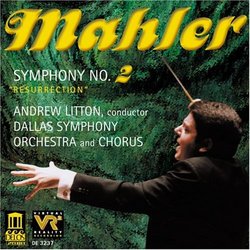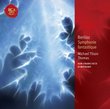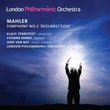| All Artists: et al Gustav Mahler (Composer) Title: Mahler: Symphony No. 2, C Minor "Resurrection" / Litton, Murphy, Lang Members Wishing: 0 Total Copies: 0 Label: Delos Records Original Release Date: 1/26/1999 Release Date: 1/26/1999 Album Type: Super Audio CD - DSD Genres: Special Interest, Classical Styles: Historical Periods, Modern, 20th, & 21st Century, Symphonies Number of Discs: 2 SwapaCD Credits: 2 UPC: 013491323725 |
Search - et al Gustav Mahler (Composer) :: Mahler: Symphony No. 2, C Minor "Resurrection" / Litton, Murphy, Lang
 | et al Gustav Mahler (Composer) Mahler: Symphony No. 2, C Minor "Resurrection" / Litton, Murphy, Lang Genres: Special Interest, Classical
|
Larger Image |
CD DetailsSimilar CDs |
CD ReviewsAn incredible disc! Joseph Hubbard | Pflugerville, TX | 07/10/2006 (5 out of 5 stars) "I was lucky enough to see Maestro Litton's farewell concert with the DSO a couple of months ago and they performed this symphony. What an unbelievable experience it was! I do not lie when I tell you it was difficult to restrain myself from standing up and screaming through the final bars. I was on the edge of my seat and short of breath as I became deeply involved and moved by the music being produced. I came across this recording a while before Litton's farewell concert and while nothing can compare to seeing and hearing it live and in such a truly special setting, this particular recording is among my favorites. Some may find a few tempos here and there a bit slow, but they are quite effective as they are never stagnant and lacking direction. The hushed reverence of the beautiful chorus entrance is very effectively delivered, extremely soft and tranquil yet very crisp. I am also a huge fan of the DSO horns and they definitely do not disappoint here. Their ascending line into the organ entrance in the finale still gives me goosebumps every time I hear it. I could go on and on about all of the memorable moments in this recording but I do not want to give too much away! My only complaint is that I would have preferred the bells at the end to be a bit more to the fore as you seem to get a lot of mallet noise that is about it, there is not a lot of resonance from the actual bells themselves. But this is a personal issue and a very minor one at that and by no means should discourage you from experiencing this disc. I'm sure most people won't mind it at all, assuming they even notice it in the first place. Aside from that, the sound has stunning depth and clarity, and it handles Litton's broad dynamic range with remarkable ease. As many other reviewers have pointed out, you should not be disappointed by the sound quality on this disc. This is easily of the best sounding cd's I own. All in all, a noteworthy disc from an incredible conductor and incredible man. Thank you Maestro Litton, your dedication and love for music is second to none." Stunning recording, powerful performance Music maven | Amherst, MA | 12/29/2006 (5 out of 5 stars) "I've heard the other Litton/DSO recordings in this series, and while the recording quality has been good throughout, the performances have struck me as a little middle-of-the-road. Based on that experience I had not expected much of this one. What a wonderful surprise this CD was! The final movement, particularly, is phenomenal. The first time I listened to it, on headphones in a record store, I had goosebumps over my entire body and tears helplessly streaming down my face--which would have been embarrassing in such a public setting, had I not been too completely carried away by the music to think about anybody else's opinion. Litton treats this final movement with a more reverential touch than most conductors--who tend to approach it as typical Sturm und Drang German music, even in the quiet sections. Litton's approach reminds us that this is a deeply spiritual composition, perhaps the most profoundly spiritual music ever written. It's mighty climax should inspire awe, not fear; transcendence, not military triumph. Litton's slower-than-usual tempos do not dampen the proceedings; rather, they add to the sense of majesty that is the point of the piece. The dynamic swings, both in terms of volume and feeling, are tremendous, and they shift very quickly, yet never seem out of control. The power of the last three or four minutes is utterly remarkable--the most shattering experience I think I've ever had listening to music. The musicians play with real feeling, and the chorus sings like their lives depend on it (which is exactly approapriate for this work). The recording is a technical wonder in its own right. Every instrument is distinct, making the various lines much easier to follow, yet all these parts are tied together in a cohesive whole. The timbre is perfect, too, top to bottom. The chorus is smooth as butter and the strings are sweet and full-bodied. There is no hard edge anywhere--and listening to this recording will make you realize how nasty most CDs are--yet the whole thing is marvelously clear. Delos makes much of the spacial qualities of the recording, which are definitely impressive, but the real star of the show in my opinion is the quality of the instruments and voices. If you love this symphony, this version will be a very worthwhile addition to your collection, and if you've never heard it, this is fine place to start. But be prepared: You'll need the biggest and best stereo you can find, wait until your family and neighbors aren't home, then turn it up to lease-breaking volume and keep a box of tissues next to your chair." Well played, well recorded, but not always well behaved Mahl MartinP | Nijmegen, The Netherlands | 09/25/2007 (4 out of 5 stars) "The thing that sets this Mahler 2 apart, as others have remarked, is the quality of the sound. Delos achieved a completely natural, gimmick free result, with a good sense of depth and space, a real sense of hall acoustic, tonal warmth through all ranges, deep and clear bass, impressive dynamic range, great transparency and no artificial spotlighting. A result all the more remarkable for being recorded live - you will, however, hear no trace of the audience. You will need to turn up the volume way beyond what you are used to, for the recording level is low, but it is worth letting your amplifier work for this. In the best of all possible worlds, such sound would be matched by a performance of a lifetime, but well...
Certainly the Dallas orchestra plays gorgeously and with utter technical skill; and at times, Litton offers insights that are rare and worthwhile. Right at the beginning I loved him for daring to count out all the rests between the semiquaver motifs. It makes up for the lack in tension in those motifs themselves. Indeed, his tempo is hazardously slow, but he does bring it off, though at `sehr langsam beginnend' (cue 16) he really takes things too far. The great `molto pesante' climax is realized magnificently, the downward run of lower strings and tuba clearly (and exceptionally) audible underneath the grinding brass. Litton is even better at creating atmosphere in quiet episodes, as at #9. And he keeps his cool at the final downward run of triplets, simply having them played as Mahler asks, in Tempo I. Yet, somehow, all this together doesn't quite add up to a thrilling first movement; moreover, I was bothered by Litton's extreme agogics in several places. With this he goes completely overboard in the second movement, which he turns into chewing gum. Incessant, deliberate ritenuti mark every turn, and the movement ends up as a parody of a minuet. The only way to understand it is to assume Litton thinks Mahler intended this piece to be caricature; what ever his theories, the result is awful. The Scherzo fares much better, fortunately. One notices the beautifully realised, quiet glissandi, or the well-observed, rarely heard bassoon motif two bars after #47. But the overall effect is too polite, lacking in sarcasm, and the final outburst is not the cataclysm it can (and IMO should) be. After that, Urlicht is wonderful, very well done, if maybe slightly businesslike; Petra Lang would yet improve on her performance here a few years later, under Chailly. The opening of the finale is suitably portentous, and one marvels at the transparency that persists despite the great noise. The first, quiet statement of the accompaniment to the `Auferstehen'theme, at #6, is magically done, Litton, again daringly, protracting the dashed notes just like Mahler asks. But then during the Allegro energico marching episode he ignores him, slowing down instead of speeding up, so that `Kräftig' a bit later ends up too slow and the sense of wild frenzy is lost. Later again this is made up for by the magnificently realized Fernorchester, that truly creates a feeling of vast distances. The chorus is exceptionally fine too, the hushed singing as well as the forte. A pity Litton came up with the silly notion of doubling the first soprano-solo emerging from the choir (#32) with a flute. But several gorgeous details that WERE written by Mahler delight the ear, like the horn chords 5 bars before #38. The final build-up is powerful, and the organ is naturally integrated in the sound picture. The whole effect, notwithstanding reticent bells, is thoroughly satisfying, and yet, where is the frisson? I want this music to lift me out of my seat, and Litton's reading simply doesn't do that. On a final note: If there is any justice left in this world I trust the designer of the cover is serving a prison sentence for it. " |

 Track Listings (25) - Disc #1
Track Listings (25) - Disc #1
![Dvorák's New World Symphony and Other Orchestral Masterworks [Hybrid SACD]](https://nationalbookswap.com/cd//m/92/2892/6122892.jpg)
![Beethoven: Les 9 Symphonies [Box Set]](https://nationalbookswap.com/cd//m/16/0516/6140516.jpg)

